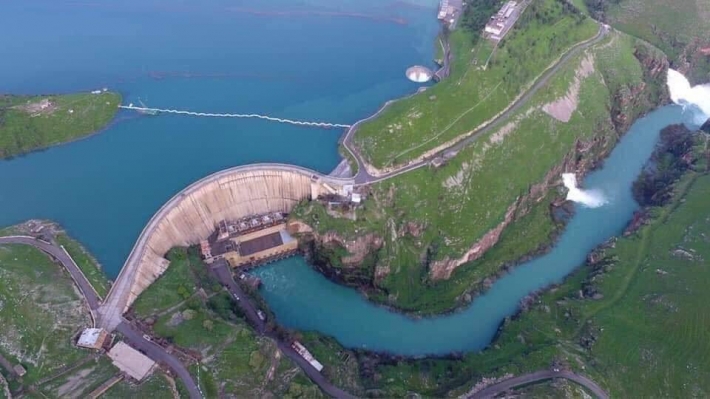Kurdistan Dams Secure Summer Water Needs Despite Regional Challenges
KRG's Director General of Dams, Rahman Khani, detailed the current storage levels, noting that the Darbandikhan Dam retains about 62% of last year's water volume, the Dukan Dam holds approximately 50%, and the Dohuk Dam maintains 80% of its previous reserves.

By Kamaran Aziz
ERBIL (Kurdistan24) — Despite a year of lower-than-average rainfall, the Kurdistan Region has secured enough water reserves to avoid shortages this summer and autumn, according to a senior water official.
Abdulrahman Khani, Director General of Dams in the Kurdistan Region, told Kurdistan24 on Sunday that although the past year was marked by drought conditions, the region's reservoirs remain adequately stocked thanks to successful water collection during the previous wet year.
"It is true that this year witnessed limited rainfall across the Kurdistan Region, preventing large-scale water storage," Khani said. "However, due to the surplus collected last year, our dams currently contain sufficient water to meet the drinking and essential needs of the region for the upcoming summer and autumn seasons."
Khani detailed the current storage levels, noting that the Darbandikhan Dam retains about 62% of last year's water volume, the Dukan Dam holds approximately 50%, and the Dohuk Dam maintains 80% of its previous reserves. Across the Kurdistan Region, dams collectively store around 3.6 billion cubic meters of water, while smaller dams built during the tenure of the ninth cabinet contain an additional 100 million cubic meters.
Notably, water has been collected across 22 dams, with several — including Jalila, Turejaf, and Awa Spi — experiencing overflows. Khani emphasized that a structured six-month management plan is in place, balancing incoming water flows with existing reserves to ensure efficient releases.
However, Khani highlighted broader challenges facing Iraq and the Kurdistan Region's water security.
He pointed out that neighboring Iran and Turkey have yet to join international water agreements, complicating cross-border water management. Many vital rivers flowing through the Kurdistan Region, such as the Alwan, Sirwan, Little Zab, and Great Zab, originate in Iran or Turkey.
Negotiations with Turkey on managing small basin dams have seen some discussions but no formal agreements. While there is a trilateral agreement between Syria, Turkey, and Iraq over the Euphrates River, a similar framework for the Tigris River remains absent.
Talks with Iran have yet to even formally begin, despite the existence of roughly 42 shared rivers and streams between Iraq and Iran.
Khani also raised concerns about reduced water flows from Turkey. "Last year, 1,000 cubic meters per second were released from dams on the Tigris River in Turkey. This year, the release has dropped sharply to only 200 cubic meters per second," he noted.
Highlighting Iraq's internal water management difficulties, Khani cited three main issues: the construction of upstream water projects by neighboring countries without agreement; the dual impact of climate change and reduced rainfall; and Iraq's reliance on outdated, wasteful water usage methods.
These problems are compounded by a growing population and deteriorating water quality, particularly in southern regions like Basra, where potable water becomes scarce during droughts.
Addressing why the Iraqi government has struggled to pressure Turkey and Iran into water-sharing agreements, Khani pointed to a complex web of political, economic, and administrative challenges. "In previous years, a roadmap was developed, but it has yet to be implemented," he said.
Despite these regional pressures and internal hurdles, the Kurdistan Region’s proactive water management has positioned it well to meet immediate needs, offering a measure of stability as broader water disputes continue to loom over Iraq's future.